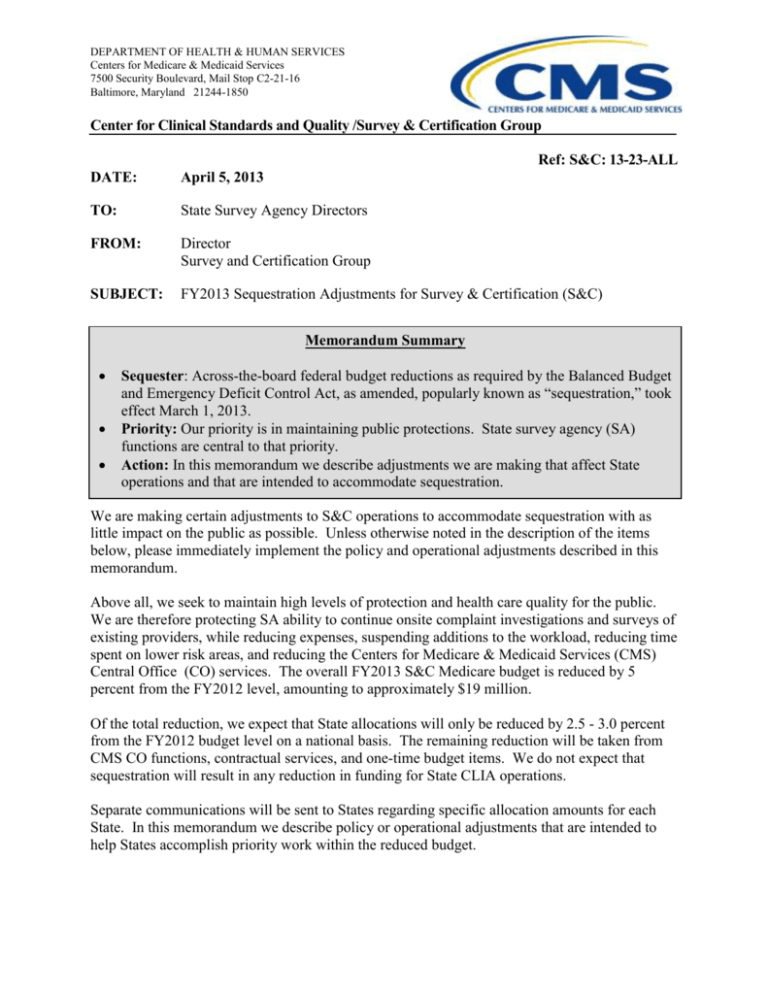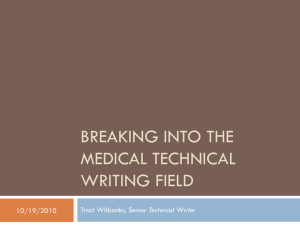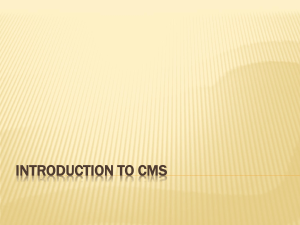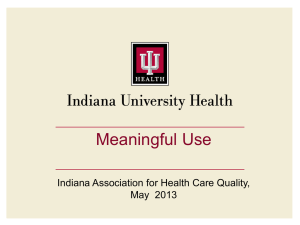S&C 13-23-All
advertisement

DEPARTMENT OF HEALTH & HUMAN SERVICES Centers for Medicare & Medicaid Services 7500 Security Boulevard, Mail Stop C2-21-16 Baltimore, Maryland 21244-1850 Center for Clinical Standards and Quality /Survey & Certification Group Ref: S&C: 13-23-ALL DATE: April 5, 2013 TO: State Survey Agency Directors FROM: Director Survey and Certification Group SUBJECT: FY2013 Sequestration Adjustments for Survey & Certification (S&C) Memorandum Summary Sequester: Across-the-board federal budget reductions as required by the Balanced Budget and Emergency Deficit Control Act, as amended, popularly known as “sequestration,” took effect March 1, 2013. Priority: Our priority is in maintaining public protections. State survey agency (SA) functions are central to that priority. Action: In this memorandum we describe adjustments we are making that affect State operations and that are intended to accommodate sequestration. We are making certain adjustments to S&C operations to accommodate sequestration with as little impact on the public as possible. Unless otherwise noted in the description of the items below, please immediately implement the policy and operational adjustments described in this memorandum. Above all, we seek to maintain high levels of protection and health care quality for the public. We are therefore protecting SA ability to continue onsite complaint investigations and surveys of existing providers, while reducing expenses, suspending additions to the workload, reducing time spent on lower risk areas, and reducing the Centers for Medicare & Medicaid Services (CMS) Central Office (CO) services. The overall FY2013 S&C Medicare budget is reduced by 5 percent from the FY2012 level, amounting to approximately $19 million. Of the total reduction, we expect that State allocations will only be reduced by 2.5 - 3.0 percent from the FY2012 budget level on a national basis. The remaining reduction will be taken from CMS CO functions, contractual services, and one-time budget items. We do not expect that sequestration will result in any reduction in funding for State CLIA operations. Separate communications will be sent to States regarding specific allocation amounts for each State. In this memorandum we describe policy or operational adjustments that are intended to help States accomplish priority work within the reduced budget. Page 2 – State Survey Agency Directors States must adhere closely to CMS priorities in conducting all survey and certification work. We will be making adjustments to the State Performance Standards System (SPSS) to accommodate the changes described in this memorandum and effects of sequestration (such as survey frequency adjustments for organ transplant centers and ESRD facilities), and to reinforce strict adherence to the CMS workload prioritization. The on-going S&C efficiency and effectiveness initiative will generate additional assistance. Those changes will be communicated as they are readied for implementation, after further consultation with States. 1. Providers that Elect to Decline Medicare Assignment: With respect to providers that plan to acquire another provider: a. Ensure that all entities that acquire providers1 and plan to decline assignment of Medicare certification (thereby resulting in termination of the existing provider agreement), are informed that there may be longer wait-times for the onsite surveys and certification work necessary period before an initial certification survey will be conducted and before Medicare participation may therefore be resumed, regardless of who might conduct the survey (State, accrediting organization, or CMS). Obtain CMS Regional Office (RO) agreement before conducting any such survey where a provider is not accepting assignment. 2. IPPS Exclusions or Addition of Locations: With respect to exclusions from the Inpatient Prospective Payment System (IPPS), or requests to add locations on the part of an existing provider: a. Ensure that entities that inquire about adding locations/services for Medicare certified providers are informed that there may be longer wait-times for any onsite surveys or certification work that may be necessary. This includes additional branches or secondary locations to an existing home health agency, hospice, hospice inpatient units, Outpatient Physical Therapy extension sites, Swing Beds, or end stage renal disease services. b. Ensure that entities that inquire about new exclusion from IPPS for Rehabilitation, Psychiatric units, or hospitals are informed that there may be longer wait-times for any certification work necessary. 3. Revisit Surveys: With respect to onsite revisit surveys that are conducted to confirm that a provider has remedied all health and safety noncompliance and restored its program to compliance with CMS requirements: a. Obtain CMS RO approval before conducting any second onsite revisit after a first revisit found that the provider had still not restored its program to substantial compliance. b. Obtain CMS CO approval before conducting a third or fourth onsite revisit (in those cases where a third or fourth revisit is permitted by CMS policy) when the prior revisit found that the provider had not restored its program to substantial compliance. c. Inform affected providers that there may be longer wait times before revisits are conducted. 1 In this memorandum, any reference to “providers” will also apply to suppliers and nursing homes. Page 3 – State Survey Agency Directors The purpose of this procedural adjustment is to promote as much efficiency and effectiveness in the revisit survey work as possible. Existing protocols already require consultation and approval from CMS for some revisits (such as third and fourth revisits), so the effect of this change is simply to change the thresholds at which the consultation occurs. 4. Critical Access Hospital (CAH) Conversions: With respect to eligible hospitals that seek to convert to the status of a CAH: Ensure that entities that inquire about converting a hospital to CAH status (and being certified by CMS as a CAH provider, are informed that there may be longer wait-times for the onsite surveys and certification work necessary. 5. Special Focus Facility (SFF) Nursing Homes: With respect to those nursing homes that have exhibited a persistent pattern of poor quality and have been enrolled in the Special Focus Facility initiative: a. Schedule a final “last chance” onsite survey for those facilities that have been on the SFF list for more than 18 months and have failed to improve. The scheduling of the survey may coincide with the next planned onsite survey, or be advanced in accordance the extent to which State monitoring continues to indicate lack of significant progress. After discussion with the CMS RO, a Medicare termination notice may be issued if the onsite survey does not reveal appropriate improvement or unless there is a major new development that CMS concludes is very likely to eventuate in timely and enduring improvement in the quality of care or safety. b. Review the progress of all other facilities that have been on the SFF list for more than 12 months. CMS staff will discuss with the SA the status of each facility and plan further action. c. Do not, until further notice, select a replacement SFF nursing home when a current SFF facility has been terminated from Medicare participation or has improved to the point of graduating from the SFF list, unless directed to do so by the CMS RO. The effect of this adjustment will be to (a) speed final resolution (preferably substantial improvement) of the issues with these nursing homes where serious problems have persisted for a considerable time, and (b) continue the SFF initiative (consistent with sections 1819(f)(8) and 1919(f)(10) of the Social Security Act), but at a temporarily reduced number of facilities. 6. Home Health Targeted Surveys: Discontinue all further Tier II targeted surveys of home health agencies (HHAs) that CMS has identified to SAs has having the lowest performance, unless directed to do so by CMS. Continue to ensure that no HHA has gone more than three years without an onsite recertification survey. Tier II HHA surveys are targeted surveys that States have been expected to conduct in addition to the statutory requirement that every HHA be surveyed at least once every three years. Page 4 – State Survey Agency Directors 7. Life Safety Code (LSC) in Nursing Homes: With respect to the LSC portion of the nursing home survey: a. We are making available, at State option, a Short Form survey that surveyors may use to assess compliance with key life-safety code requirements for those nursing homes that CMS determines have a consistently good track record of LSC compliance in the past, provided the nursing home is also fully-sprinklered. CMS will provide a list to each SA regarding the facilities that may qualify for the Short Form survey. There will be no option for use of the Short Form for a facility that is not 100 percent fully sprinklered. b. States electing this option for the identified facilities will be required to provide some basic information to CMS CO so that we may evaluate the results of this option. c. A Short Form LSC survey was available prior to 2006 but discontinued. Certain targeting and quality controls will apply to the use of the Short Form survey option. S&C Memorandum 13-22-NH (April 5, 2013) offers more specific details as to this option and the methods by which a State might may do so. 8. Organ Transplant Program Surveys: With respect to onsite surveys of solid organ transplant programs: a. We are reducing the frequency of onsite recertification surveys for organ transplant programs, from an average of once every three years to once every four to six years, while maintaining CMS CO continuous monitoring and analysis of transplant center conformance with CMS expectations for outcomes, such as patient and graft survival. b. We will work with those States that currently conduct organ transplant center surveys to effect a transition of the surveys process to the National Contractor. Currently, about half of the States conduct transplant center surveys with supplemental funding provided by CMS, while transplant centers in the remaining States are surveyed by the CMS National Contractor. A separate communication has been issued to States regarding this transition of surveys to the National Contractor. For those States that have been conducting transplant center surveys themselves, the funding was included in the State’s FY2013 allocation and the State’s allowable costs for such surveys that have been done in FY2013 (or by agreement will be done) will continue to be honored. We will work out transition arrangements individually with affected States for FY2013 and FY2014 to avoid any significant negative impact on State surveyors who have been specially trained for transplant surveys. Page 4 – State Survey Agency Directors 9. Complaint Investigations: With respect to complaint investigations for certain hospitals2: a. For both deemed and non-deemed hospitals and critical access hospitals (CAHs), limit the onsite investigations to those allegations that, if substantiated, would likely result in a finding of Condition-level deficiency or Immediate Jeopardy3. b. For hospitals and critical access hospitals that are deemed, inform the complainants regarding their option to file a complaint directly with the appropriate accrediting organization, and provide the necessary contact information for them to do so. However, substantial allegations that, if substantiated, would likely result in a finding of Condition-level deficiency or Immediate Jeopardy, must continue to be investigated by the SA. We will issue a separate communication with more specific instructions regarding the processing of complaints, as well as the applicability of this approach to other types of providers. Effective Date: Immediately. This policy should be communicated immediately with all survey and certification staff, their managers and the State/RO training coordinators. Contact: Contact your CMS RO. /s/ Thomas E. Hamilton cc: Survey and Certification Regional Office Management 2 These limitations do NOT include long term care hospitals or psychiatric hospitals. For those two types of hospitals, continue with the current SOM procedures. The new limitations DO APPLY to all other forms of hospital identified in the Social Security Act, such as short-term acute care, and rehabilitation hospitals. In addition, the limits apply to critical access hospitals (CAHs). 3 These are the protocols that already apply to deemed hospitals. We are now invoking these protocols for nondeemed hospitals pursuant to the budget reductions referenced here.




